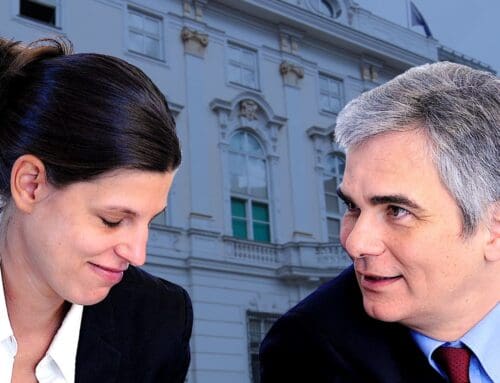
Critics Call It Theocratic and Authoritarian. Young Conservatives Call It an Exciting New Legal Theory.

CAMBRIDGE, Mass. — It was half past two in the Revolution Room when Georgetown University law professor Randy Barnett stepped up to the podium to introduce the final panel of the day. By that point in the afternoon, the symposium’s audience — composed of about 100 legal scholars, law students and a smattering of federal judges — had sat through six consecutive hours of abstract legal theorizing, and more than a few pairs of eyes were beginning to glaze over. Sensing, perhaps, the room’s flagging energy, Barnett impressed upon the crowd the momentous nature of what they were witnessing.
“For those of you who are students, you might think that this is what all academic conferences are like,” Barnett said. “But let me just tell you: This is not what they’re like. You will tell your students or your progeny someday that you were at this conference, and that you got to see what was happening here.”
Barnett was right that the gathering taking place at the Sheraton Commander Hotel on the Saturday before Halloween wasn’t your average law school symposium. The event was serving as a much-anticipated referendum on one of the most contentious ideas to emerge from the legal academy in recent years, and many of the biggest names in American constitutional law had come to Cambridge to join the debate.
At the center of this debate was Harvard law professor Adrian Vermeule, whose latest book served as the ostensible subject of the symposium. In conservative legal circles, Vermeule has become the most prominent proponent of “common good constitutionalism,” a controversial new theory that challenges many of the fundamental premises and principles of the conservative legal movement. The cornerstone of Vermeule’s theory is the claim that “the central aim of the constitutional order is to promote good rule, not to ‘protect liberty’ as an end in itself” — or, in layman’s terms, that the Constitution empowers the government to pursue conservative political ends, even when those ends conflict with individual rights as most Americans understand them. In practice, Vermeule’s theory lends support to an idiosyncratic but far-reaching set of far-right objectives: outright bans on abortion and same-sex marriage, sweeping limits on freedom of expression and expanded authorities for the government to do everything from protecting the natural environment to prohibiting the sale of porn.

But if the symposium’s nominal subject was Vermeule’s new book, which shares the name of his theory, its real concerns were much broader. Since it was published in February of this year, Common Good Constitutionalism has become a flash-point in a broader intra-conservative debate about the future of the conservative legal movement. This debate is unfolding in the shadow of the Supreme Court’s landmark decision in Dobbs v. Jackson Women’s Health, but its scope extends far beyond constitutional debates over abortion. This conflict hinges on a more fundamental philosophical question: Does originalism — the theory of constitutional interpretation that conservatives have championed for the past 40 years — provide the conservative movement with the sort of intellectual ammunition that it needs to tear down half a century of liberal jurisprudence and rebuild American law on more conservative foundations? Or is it time, now that conservatives have secured a decisive majority on the Supreme Court, for the right to embrace a more aggressive and ideologically assertive legal theory?
On the one side of this debate are defenders of the conservative legal status quo, who made up the majority of the speakers at the Cambridge symposium. By and large, these conservatives continue to champion the time-honored legal principles of the right: the sanctity of individual rights, the importance of judicial restraint and the wisdom of limited government. Practically all of them continue to identify as originalists.
On the other side of the debate are those who, like Vermeule, want to push the conservative legal movement in a more radical direction. Partisans of this camp hail from different sectors of the American right, and they go by different names. (Some eschew the label of “conservative” for the edgier “postliberal” or “integralist,” two terms that are variously applied to Vermeule.) But they have cohered around a shared desire for a more muscular judiciary, one that sheds the guise of judicial neutrality in favor of a more assertive right-leaning posture. The members of this camp are almost uniformly critics of originalism — or at least of originalism as it’s practiced now — and many, though not all, are Catholic. They remain a distinct minority within the broader conservative ecosystem, but as the youthfulness of the audience in the Revolution Room suggested, their ideas have made particular inroads among young conservative lawyers and law students.
“These are the things that people are talking about in FedSoc chapters all over the place,” said a clean-cut law student from Georgetown University as we chatted under the hotel’s marquee, referring to the conservative legal behemoth the Federalist Society. “I think our generation is a lot more open to it than the older generation.” (The student asked not to be identified by name, saying it can be “risky” to associate with Vermeule’s ideas.)
For the most part, the debate between these two factions has been unfolding outside of the conservative mainstream. Instead, it’s being hashed out in the pages of academic law journals, in back-and-forths on obscure conservative blogs and in the nerdier corners of conservative legal Twitter, where Vermeule was until recently a prolific — and occasionally controversial — poster. In 2020, he was criticized for comparing attendees at a conservative legal conference to detainees in “camps,” which some interpreted as making light of the Holocaust. (Vermeule declined multiple requests to be interviewed for this article.) In the mainstream press, the fact that a heated debate is underway in the conservative legal movement has been largely obscured by the right’s triumphalist tone in the aftermath of the Court’s decision in Dobbs.

But the gathering in the Revolution Room represented the clearest sign yet that the debate is seeping into the conservative mainstream. After all, the symposium’s hosts were two prominent organs of the conservative legal movement: the Harvard Journal of Law and Public Policy (JLPP), which pitches itself as “the nation’s leading forum for conservative and libertarian legal scholarship,” and the Harvard chapter of the Federalist Society, arguably the most influential student branch of the most powerful conservative legal organization in the country.
“The debate between originalism and common good constitutionalism is the debate on the legal right, right now,” said Mario Fiandeiro, the editor-in-chief of JLPP and the lead organizer of the symposium, when I called him a few months before the symposium.
When we spoke, Fiandeiro made it clear that the event was not intended as an endorsement of Vermeule’s ideas. The purpose, he said, was simply to bring the discussions over common good constitutionalism out into the open, fostering free and robust debate about an important issue on the legal right. If the symposium was all about fostering debate, I asked Fiandeiro, would it be all right if I checked it out myself? Absolutely, Fiandeiro told me, and a few weeks later, I received an emailed confirmation of my registration.
But as the date of the symposium approached, there was reason to doubt whether free and robust discourse was really what the organizers had in mind. Two days before the symposium was set to begin, my phone pinged with a message from Fiandeiro informing me that my credentials had been revoked and the symposium closed to all press. (As far as I could tell, I was the only member of the media who was actually planning to attend, and Fiandeiro wouldn’t tell me who didn’t want me there.) My frustrated appeals to Fiandeiro and the higher-ups at the Federalist Society — which touts an open press policy on its website — failed, though I was politely informed that I could watch a live stream of the proceedings on the journal’s Facebook page.
As I had already traveled to Cambridge for the event, I settled on tuning into the live stream from the lobby of the hotel, where I would at least be close to the action. Oh well, I thought to myself: The revolution might not be televised, but at least it’ll be live-streamed.
The symposium had initially caught my attention when it was announced in August because it reminded me of another important episode from the annals of conservative legal history — one that, at least on paper, sounded a lot like the event that was about to take place in Cambridge.
Forty years ago, in the spring of 1982, a handful of conservative law students at Yale Law School convened a three-day-long event called “A Symposium on Federalism.” The purpose of that symposium was to chart a path forward for legal conservatives, who at that point constituted only a loosely connected network of like-minded lawyers and judges. The legal buzzword on the tip of everyone’s tongue back then was “originalism,” a new theory of constitutional interpretation that counseled judges to interpret the Constitution in light of the “original public meaning” that it had at the time of its ratification in the 1780s. Among the participants at the symposium was University of Chicago law professor Antonin Scalia, a leading proponent of the new theory, and former Yale scholar Robert Bork, who had recently left New Haven for a seat on the federal bench.
Today, that symposium at Yale is remembered as the event that birthed the Federalist Society, which has since grown from a handful of disgruntled law students into the most powerful conservative legal organization in the country. Originalism, meanwhile, has been transformed from a marginal academic theory into the intellectual cornerstone of the conservative legal movement.

Of course, hundreds of academic symposia happen every year at law schools around the country, and very few of them spawn movements that transform the federal judiciary. But the lesson of the Yale event was clear: If you want to understand the future of the conservative legal movement, don’t ignore the mundane academic conferences. If another legal insurgency was brewing in Cambridge, it couldn’t hurt to be in the room for it.
The origins of this potential insurgency are often traced to an essay that Vermeule published in The Atlantic in March 2020 under the headline “Beyond Originalism.” In that piece, Vermeule set the stage for his broader intellectual take-down of conservative legal orthodoxy. In the latter decades of the 20th century, Vermeule argued, originalism had been a useful political tool for conservatives, allowing them “to oppose constitutional innovations by the Warren and Burger Courts [by] appealing over the heads of the justices to the putative true meaning of the Constitution itself.” But following the rise of the conservative legal movement in the ’90s and 2000s, originalism had “outlived its utility,” becoming “an obstacle to the development of a robust, substantively conservative approach to constitutional law and interpretation.” Instead of offering a bold vision of judicial power, originalism had mired conservatives in “tendentious law-office history and endless litigation of dubious claims about events centuries in the past.”
Vermeule coined the term “common good constitutionalism” to describe his alternative theory, and he was not coy about what it would entail. Unlike originalists and legal liberals, common good constitutionalists would not “suffer from a horror of political domination and hierarchy,” and they would display a “candid willingness to ‘legislate morality.’” In sharp contrast to libertarian conservatives, common good constitutionalists would favor “a powerful presidency ruling over a powerful bureaucracy.” On the Constitutional front, “The Court’s jurisprudence on free speech, abortion, sexual liberties, and related matters [would] prove vulnerable” to new challenges.
With the country freshly locked down by the pandemic, Vermeule’s article went viral — or at least as viral as a 2,500-word essay on academic jurisprudence can go. On the right, conservatives objected to Vermeule’s claim that originalism was nothing more than an instrument for advancing their political agenda. On the left, liberals seized on Vermeule’s critique as proof of the political agenda they had long claimed lay behind originalism.
On both the left and the right, commentators regarded Vermeule’s call for a new “illiberal legalism” with a mix of curiosity and suspicion. In a response that was also published in The Atlantic, University of Baltimore law professor Garrett Epps denounced Vermeule’s thesis as an argument for “authoritarian extremism.” Representing the right-of-center point of view, Barnett dryly observed: “There seems to be something authoritarian in the water of Harvard Law School.”
But Vermeule’s vision of a more muscular conservative jurisprudence did strike a chord with certain sectors of the right. In The American Mind, an online journal published by the Claremont Institute, the conservative legal scholar and prominent anti-abortion activist Hadley Arkes applauded Vermeule for “[having] the gall to say that there were principles in existence before the text of the Constitution was drafted.” A few months later, an anonymous conservative lawyer launched a blog called “Ius & Iustitium” to serve as a platform for debates over Vermeule’s theory. (The blog, which takes its name from the Latin word for “right,” has become something like an in-house publication for common good constitutionalists.)
The debate over Vermeule’s proposal really went into hyperdrive that summer, following the Supreme Court’s controversial decision in a case called Bostock v. Clayton County. In that case, the Court ruled by a 6-3 margin that Title VII of the Civil Rights Act — which prohibits discrimination on the basis of sex — also forbids discrimination on the basis of sexual orientation. The majority opinion was authored by Donald Trump appointee and Federalist Society darling, Neil Gorsuch, who justified his decision by appealing to the “original public meaning” of Title VII, a signature move of originalist analysis.
Conservatives were apoplectic. In a speech on the Senate floor, Sen. Josh Hawley (R-Missouri) warned the decision marked “the end of the conservative legal movement … as we know it.” Sounding a distinctly Vermeulian note, he added: “If you can invoke textualism and originalism in order to reach a decision [and] an outcome that fundamentally changes the scope and meaning and application of statutory law, then textualism and originalism and all of those phrases don’t mean much at all.”
In retrospect, Hawley’s speech may have veered into hyperbole, but at the time, it did capture a growing sense of frustration — even despair — among young legal conservatives who felt betrayed by Gorsuch’s use of conservatives’ favorite legal tool tactic to advance a liberal political goal
“As a practical matter, a lot of young legal conservatives thought, ‘Why should we continue to support this project?’” said Joel Alicea, an assistant professor of law at the Catholic University of America. “There were a lot of younger legal conservatives who were more open to the idea of alternatives to originalism because they were so disappointed in the results that originalism had brought them.”
Surveying the field, many of those young conservatives found only one viable alternative: common good constitutionalism. Suddenly, Vermeule’s theory was looking a lot less like the ramblings of a grumpy law professor and a lot more like a roadmap for a movement that had lost its North Star.
Common Good Constitutionalism was pitched as Vermeule’s decisive follow-up to his Atlantic article, but when the book finally appeared in February of this year, it was viewed by many of Vermeule’s supporters as something of a letdown. Rather than expanding upon the incendiary claims that Vermeule had made in his Atlantic piece, the book offered a rather dry and academic exposition of Vermeule’s broader intellectual project, which he calls “the classical legal tradition,” or “classical law” for short.
The central tenet of the classical legal tradition is that the purpose of the law is to promote the common good of a political community — not, as small-L liberals argue, to protect individual rights and liberties. As Vermeule defines it, the “common good” describes the supposedly objective set of political conditions that promote “the happiness and flourishing of the community” — namely “justice, peace, and abundance,” which Vermeule updates for the 21st-century context as “health, safety, and economic security.” (During one of the panels at the symposium in October, Michael Foran, a scholar from the University of Glasgow, suggested that “bigoted views or preferences of the racist or sexist” are incompatible with a robust notion of the common good; Vermeule, notably, has not said anything so bold.)
When it comes to Constitutional and statutory interpretation, the classical legal tradition directs judges and other public authorities to read the written law in light of what Vermeule calls “ius” — an unwritten set of legal principles and moral norms drawn from the Western legal tradition, stretching all the way back to the time of the Roman Republic. Read in this way, Vermeule argues, the Constitution’s primary aim is to ensure that public authorities have “both the authority and the duty to rule well,” rather than to advance the “liberal goal of maximizing individual autonomy or minimizing the abuse of power.” In Vermeule’s account, originalism and progressive living constitutionalism both err insofar as they ignore ius, treating the Constitution as “a sort of law without mind,” as Vermeule puts it.

Back in Cambridge, the symposium’s attendees could be forgiven for wondering how all this talk about ius and the classical law related to the slow-moving political crisis engulfing the Supreme Court. In September, a Gallup poll found that public trust and confidence in the federal judiciary had fallen to 47 percent, the lowest point in the history of the poll. What, if anything, common good constitutionalism had to say about this development was anyone’s guess.
But the symposium offered some important clues about the ways that Vermeule’s ideas have shifted not only the terms of the debate within the conservative legal movement, but also the actual exercise of conservative judicial power.
The first clue came during the opening panel of the day, which featured three federal judges in conversation with two scholars and one Canadian judge. Among the panelists was James Ho, a plump, 49-year-old judge from the United States Court of Appeals for the Fifth Circuit who in 2020 was included on Trump’s short list of 25 potential nominees to fill a future Supreme Court vacancy. In early October, Ho made national headlines for announcing that he would no longer hire law clerks who were graduates of Yale Law School, part of an effort to push back against “cancel culture” in America’s law schools. (“I don’t want to cancel Yale — I want Yale to stop canceling people like me,” Ho said in his speech announcing the boycott, which he delivered at a Federalist Society event.)

At the symposium, Ho identified himself as a stalwart originalist but noted that he is “not an opponent” of common good constitutionalism. “I actually deeply appreciate and respect Professor Vermeule’s criticism — in fact, I’ve voiced similar criticism myself,” he said in his opening remarks.
In particular, Ho argued that originalists and common good constitutionalists share a common adversary: “fair-weather originalists,” or judges who abandon originalist principles when they lead to outcomes that “cultural elites” — presumably liberal cultural elites — don’t like. In cases like these, Ho argued, “Common good constitutionalism can do a lot to push back against fair-weather originalism. In fact, it already has.”
Ho’s comments hinted toward one potential path forward for common good constitutionalism — a path that many of the panelists in Cambridge seemed willing to endorse. In this view, common good constitutionalism will continue to flourish not as a rival to originalism but as a complement to it, ensuring that originalist judges fall in line with the conservative movement’s broader political agenda.
“If I’m a federal judge who wants to be at the top of President DeSantis’ list of appointments to the Supreme Court, but I don’t want to necessarily write an opinion explicitly getting into common good constitutionalism, perhaps showing up at a conference or writing a paper on common good constitutionalism is the next best thing to be emphasizing that I am part of the project,” said Michael Smith, a visiting professor at the University of Idaho School of Law, when I called him after the symposium. In Cambridge, Smith had been one of the few panelists who offered a left-of-center critique of common good constitutionalism, which he has called a “nakedly political approach to constitutional interpretation.” But he said that even he was surprised by how eager an originalist judge like Ho had been to stake out common ground with Vermeule.
“It was a little bit eye-opening to sort of see that happening in practice,” he told me.
The second clue about the influence of Vermeule’s theory came later in the afternoon, during a panel on the relationship between common good constitutionalism and originalism moderated by Randy Barnett, the Georgetown professor. The first speaker on the panel was Josh Hammer, a 33-year-old conservative pundit and podcaster who currently serves as the opinion editor of Newsweek.
In conservative circles, Hammer has become a prominent spokesman for the brashly nationalistic group of conservatives who march under the banner of “national conservatism.” The “NatCons,” as they’re sometimes called, distinguish themselves from traditional conservatives by their explicit rejection of free-market economic orthodoxy, their embrace of nominally pro-worker welfare and industrial policies and their especially fierce prosecution of the culture war. Their annual conference, the third edition of which took place this past September in Miami, has garnered much media attention as the intellectual nerve center of Trumpism, though many of its adherents have begun to not so subtly align themselves with Trump’s would-be rival, Ron DeSantis.
On the panel, Hammer made the case for a middle-ground position between originalism and common good constitutionalism called “common good originalism,” a hybrid term he first coined in May 2020, in a Atlantic essay“,“link“:{„target“:“NEW“,“attributes“:[],“url“:“https://americanmind.org/features/waiting-for-charlemagne/common-good-originalism/“,“_id“:“00000184-f88e-d75d-a785-f8decd9e0006″,“_type“:“33ac701a-72c1-316a-a3a5-13918cf384df“},“_id“:“00000184-f88e-d75d-a785-f8decd9e0007″,“_type“:“02ec1f82-5e56-3b8c-af6e-6fc7c8772266″}“>response to Vermeule’s Atlantic essay published in the Claremont Institute’s The American Mind. Like Vermeule, Hammer argued that conservatives should reject “legal positivism” — the belief that law can be reduced entirely to a set of social conventions, like the rules of chess or billiards — and embrace a more muscular and overtly moralistic jurisprudence. But unlike Vermeule, Hammer has tried to elaborate this approach within the pre-existing framework of originalism.

“If there’s a way to kind of salvage that label [of originalism], and perhaps even reorient or redefine it for the fights that are to come,” Hammer said when we spoke on the phone before the conference, “that strikes me as an easier sales pitch to make, rather than just try to create something new from scratch.”
In practice, Hammer told me, common good originalism would shift conservatives’ focus away from the sort of bloodless economic issues that still garner a lot of attention in Federalist Society circles — things like shrinking the administrative state, rolling back government regulation and preserving the doctrine of Chevron deference — and redirecting those energies toward the “civilizational” (i.e., culture war) issues that social conservatives really care about. At the same time, it would allow judges to be upfront about the moral principles that inform their decision-making.
“Leftist jurisprudence is not even pretending to hide what it stands for,” Hammer said. “When the right comes back and just starts citing dates and dictionaries, that’s going to lose.”
On the civilizational front, Hammer told me, conservatives should prioritize overhauling the Court’s 14th Amendment jurisprudence, beginning by overturning Obergefell v. Hodges, which recognized a constitutional right to gay marriage, and Griswold v. Connecticut, which struck down bans on the use of contraceptives. On the abortion question, Hammer has argued that common-good conservatives should embrace the so-called “fetal personhood” doctrine, which holds that unborn fetuses are people under the 14th Amendment’s Equal Protection Clause, and which in practice would amount to a federal ban on abortion. In a lengthy Journal of Law and Public Policy„,“_id“:“00000184-f442-d955-a1a6-fe56db810000″,“_type“:“02ec1f82-5e56-3b8c-af6e-6fc7c8772266″}“>piece published in the Journal of Law and Public Policy in 2021, Hammer wrote that common good originalism would “more readily support” the relatively fringey right-wing theory that the 14th Amendment does not guarantee citizenship to the children of undocumented immigrants born in the United States.
The other major target for the common good-oriented approach is the Court’s First Amendment jurisprudence, where both Hammer and Vermeule openly reject the free speech absolutism that reigns among more libertarian-minded conservatives. Hammer pointed to two opinions by Justice Samuel Alito to illustrate what this approach would look like in practice. The first, Alito’s solo dissent in the 2010 case United States v. Stevens, argued in favor of upholding a law that made it illegal to sell videos depicting animal cruelty. The other, from the 2011 case Snyder v. Phelps, held that the First Amendment should not protect the speech of religious extremists who picketed the funeral of a dead Marine. In a similar vein, Hammer has endorsed Justice Clarence Thomas’s argument that the Court should revise the “actual malice” standard from the landmark 1964 ruling in New York Times Co. v. Sullivan to make it easier for public figures to sue publications for defamation.

If all of this sounds a bit like a souped-up version of the originalism already practiced by the Court’s conservative majority — well, that’s sort of the point. In one sense, Hammer and Vermeule articulate a prescriptive set of norms about how conservative judges should decide future cases. But in another sense, they offer a fairly accurate description of the ideological transformation that’s already underway among the Court’s conservative bloc.
“He’s basically already doing it to an extent — he’s just not explicitly saying it,” said Hammer of Alito’s recent rulings. “In close cases, you defer not necessarily to the idiosyncratic norms of individual liberty, but you defer to this more cohesive, consolidationist idea of what is good for the body politic [and] what is good for ordered liberty.”
The few reviews of Common Good Constitutionalism that have appeared in left-of-center publications have been sharply critical of Vermeule’s argument. Writing in the American Prospect„,“link“:{„target“:“NEW“,“attributes“:[],“url“:“https://prospect.org/culture/books/what-common-good-vermeule-review/“,“_id“:“00000184-f88e-d75d-a785-f8decd9f0000″,“_type“:“33ac701a-72c1-316a-a3a5-13918cf384df“},“_id“:“00000184-f88e-d75d-a785-f8decd9f0001″,“_type“:“02ec1f82-5e56-3b8c-af6e-6fc7c8772266″}“>American Prospect this past April, Micah Schwartzman and Richard Schragger, law professors at the University of Virginia, cautioned that Vermeule’s argument “underwrites a dangerous shift in jurisprudence on the right,” tying it explicitly to Vermeule’s support for a neo-reactionary political philosophy called “integralism.”
“Readers should not be gullible about what common good constitutionalism represents,” Schwartzman and Schragger wrote. The theory “serves Vermeule’s larger goal, which is the establishment of a state integrated with — or, more accurately, subordinated to — religious ends.”
Many conservative scholars were equally skeptical of Vermeule’s book. In a critical review of Common Good Constitutionalism published online in August, William Baude of the University of Chicago and Stephen Sachs of Harvard categorized the book as a “constitutionalist manifesto,” a hybrid genre that sits uneasily between scholarly treatises and political pamphlets.
“What the book primarily delivers isn’t right-wing substance, but right-wing feeling,” Baude and Sachs wrote. “Generating this feeling is the book’s true genius, which will likely make it a prominent bible of conservative discontents in the next generation.”

But at least one element in Vermeule’s book proves difficult to write off as a purely academic thought experiment — especially when read against the backdrop of the increasingly anti-democratic turn of today’s GOP.
Toward the end of the book, in a section with the unassuming title of “Applications,” Vermeule sketches his view of administrative law, the set of rules and procedures that govern the operations of the executive branch agencies. In the context of the American legal order, Vermeule argues, the administrative state — even more so than the judiciary — operates as “the living voice of the law,” serving as “the main locus and vehicle for the provision of goods” cherished by the classical tradition. As the living voice of the law, the administrative state should be given broad deference by Congress and the courts to “specify policy within the bounds … of the overall statutory task.” In concrete terms, this is an argument in favor of a New Deal-style centralized bureaucracy, empowered to pursue a socially conservative agenda and insulated from democratic accountability and judicial oversight.
As a corollary to his argument for a strong administrative state, Vermeule offers another theory about the principle of “subsidiary,” a term that he borrows from Catholic social teaching. As it’s traditionally understood in Catholic political thought, subsidiary is a principle about the limits of government: It states that whenever possible, the more powerful authorities in a society should defer to less powerful authorities to perform responsibilities that either entity could legitimately carry out. But in Common Good Constitutionalism, Vermeule offers another reading of subsidiary, according to which powerful public authorities have not only a right but a duty to step in when less powerful political authorities fail to protect the needs of the common good: “There should exist a public authority with the jurisdiction to act, under exceptional circumstances where the operation of subsidiary fails, so as to promote the common good through the policy overriding if necessary the views of any subordinate jurisdiction,”Vermeule writes.
Taken together, these two arguments read an awful lot like a defense of a pseudo-constitutional dictatorship, or at the very least as a plausible legal justification for a right-wing coup. Vermeule doesn’t go to great lengths to obscure this conclusion. At the end of the section on subsidiary, he cites the Catholic theologian Johannes Messner to argue that in some cases, a limited form of dictatorship may “be compatible with the principle of subsidiary.”
Maybe there’s a more charitable way to read these passages so that they don’t lead to such a startling conclusion. But if there is, I certainly didn’t hear it in Cambridge.
Nobody that I spoke with either at the Commander or elsewhere could really agree about what the future of common good constitutionalism will look like. The debate over this question, I quickly discovered, breaks down along roughly the same lines as the debate over Vermeule’s book: Defenders of the conservative legal status quo argue that common good constitutionalism is a flash in the academic pan, with little hope of influencing the actual operation of the conservative legal movement. Meanwhile, Vermeule’s allies point to young legal conservatives’ enthusiasm for a more common-good-oriented approach as proof that the debate is just getting underway.
Members of the former camp tend to cast Dobbs as the final nail in the coffin for Vermeule’s project, arguing that the decision demonstrated that originalism can still deliver the sort of outcomes that social conservatives demand from the conservative legal movement.
“One might look back on this and say that it represented the high-water mark of common good constitutionalism as a rival to originalism,” said Barnett when I spoke with him on the phone after the symposium. “Because the Dobbs case was decided the way it was, I think that took away some of the impetus to look for alternatives.”
But Vermeule’s allies say that common good constitutionalism has always been about more than a single case, even an epochal one like Dobbs.
“The theoretical objections [to originalism] haven’t changed — they just haven’t,” said Hammer when we spoke before the symposium. “The idea that legal interpretation cannot be divorced from truth or the sense of transcendental order or natural justice … I’m cautiously optimistic that this [idea] is not going anywhere.”
What is clear is that Vermeule’s ideas are still finding an audience with influential members of the conservative political establishment. Two weeks before the symposium, Vermeule delivered a keynote address at a small conference at Franciscan University of Steubenville in Ohio, which featured a guest appearance by then-Senate hopeful — and now Senator-elect — J.D. Vance. The week before that, Hammer offered a fiery defense of common good originalism at the National Conservatism Conference in Miami, which included speeches from DeSantis, Hawley and Florida senators Marco Rubio and Rick Scott. If common good constitutionalism has any chance of making the leap from Cambridge to the Capitol, it will likely hinge on the support of these members of the GOP.

Moreover, Dobbs’ influence on the debate over common good constitutionalism has been slightly more complicated than many of Vermeule’s critics have made it out to be. Somewhat counterintuitively, support for a conservative alternative to originalism remains quite strong among some hard-line anti-abortion activists, many of whom hoped that the Court’s conservative majority would endorse their view that the 14th Amendment bans abortion as a matter of constitutional law. The Court’s decision, which rejected that argument and returned the question of abortion to the states, instead confirmed their suspicion that originalism lacks any real foundation in the moral principles of conservatism.
“The chief foe of our time is legal positivism — we are in firm agreement [on that],” said Garrett Snedeker, the deputy director of the James Wilson Institute, an organization founded by Hadley Arkes, the anti-abortion activist. When I spoke with Snedeker and Arkes on Zoom earlier this year, they told me that they broadly agree with Vermeule’s argument for a “morally thick jurisprudence,” even while they disagree with his views on the administrative state.
“The received wisdom of what we would consider to be mainstream originalism — an originalism that prides itself on the careful avoidance of moral questions, positivism, restraint — that wasn’t the Francis Fukuyama end of history,” Snedeker told me. “We are not content with saying, ‘Aha, it’s been found out now, and now the next phase will be debating the most narrow issues.’”
And like Vermeule, they don’t buy the argument that Dobbs marked the final triumph of originalism.
“To our friends in conservative jurisprudence who think that Bostock was a one-off, who think Dobbs has foreclosed any kind of debate on this, I offer them Justice Scalia’s words in [Lawrence v. Texas],” Snedeker said, referring to a 2003 case that overturned a conviction under Texas’ “homosexual conduct” law. “Do not believe it.”
As I left Cambridge, it was impossible to know which side of the debate had it right — the skeptics or the boosters. But as my train back to New York lumbered through New Haven, I couldn’t ignore the reminder of what had begun there in 1982. A handful of conservative law students and legal scholars have already transformed America’s legal landscape once. Who’s to say they won’t do it again?







